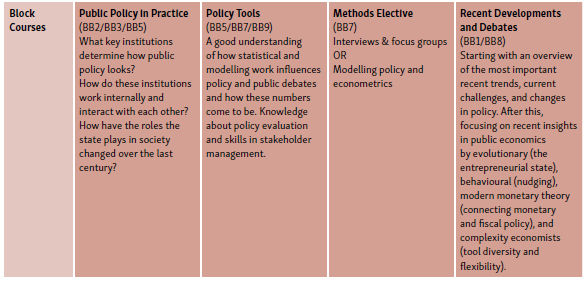Programme slogan: Economics for the common good
Example Curricula
This chapter provides examples of how economics programmes could look and be structured. Such proposals help make the debate concrete and bring out potential trade-offs. This is important because critics of current programmes often simply ask to teach more and more, without considering practical limits on time and content. Curriculum proposals help us to flesh out not only what could be added to a programme, but also what could be left out. In addition, these examples show how the building blocks of Economy Studies can be combined to form coherent programmes.
This chapter is also intended to make clear once again: Economy Studies is not a blueprint of a single, ‘ideal’ curriculum. It is possible to design a wide variety of programmes with these building blocks, and it is our hope that they will be used for this. We firmly believe that the world is best served with a wide variety of economists. One size does not fit all.
Example Curricula:
- Bachelor in Economics with a Theoretical Focus
- Bachelor in Economics with a Real-World Focus
- Major Economics in a Liberal Arts and Sciences Programme
- Master in Public Economics
- Design Your Own Curriculum, Step by Step
- Master in Financial Economics
- Master in Economics of Climate Crises
- Research Master in Industrial Economics
Example Curriculum 4: Master in Public Economics
This master’s programme prepares students for a position in the public or semi-public sector. It focuses not so much on the market-related functions of the state such as regulation, but rather on its core activities. This includes the organisation of public services such as physical infrastructure, education and healthcare, and its activities such as taxation and welfare support.
The programme is somewhat less academic and more practical than most example curricula in this book. It is very much focused on the real world of public policy, rather than abstract theory and academic research methods. The first semester does start, however, with a broader, more theoretical discussion of the state, as seen from various perspectives in economics and neighbouring disciplines. This is coupled with a course on the process of public policy in practice. The following courses bring in discussions about the normative questions involved in government activities, as well as providing hands-on experience with various policy tools.
The second semester introduces a theme elective, diving deeper into several of the aforementioned core functions of the state, as well as a methods elective focused on practically oriented research skills. The programme is concluded with a thesis, written in the form of a practical policy paper on a real-world issue that the government in that country is currently dealing with. This is alongside a course on recent developments in policy-making, which provides an overview of the major challenges defining the current era, as well as several possible and actual state responses to them.
Programme overview

